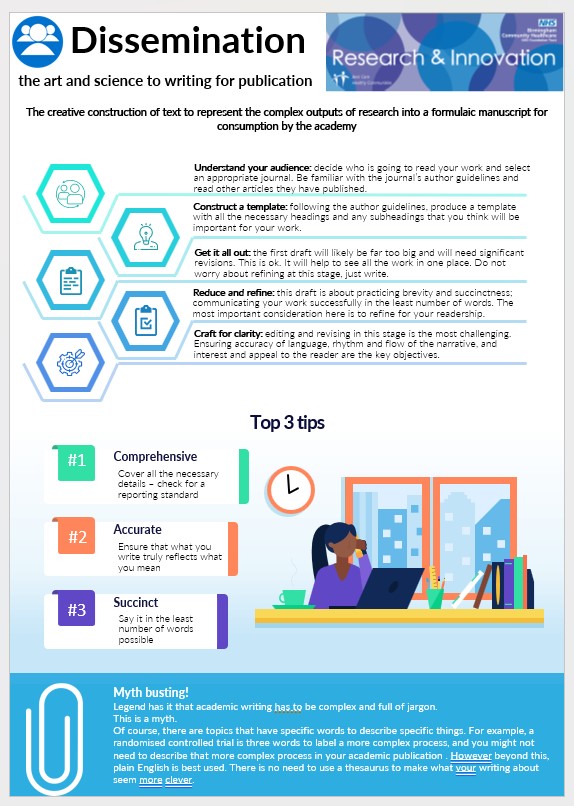Dissemination means sharing your research findings with people who will benefit from understanding them. To maximise the benefits of the research you have done, your findings need to be communicated effectively and without delay.
Summarise what the user of CIPI should learn in this section
By watching the videos on this page and reading the contents of the page you will understand:
- Identify the audiences you might need to reach. There may be several groups of people with different needs, for example you may need to think about how you would share your findings with young people, their parents, elderly people and their families / carers, healthcare professionals and other researchers.
- Learn about different ways of disseminating information, for example via a co-produced video, conference poster or presentation, abstract, journal article, producing new clinical guidelines, book chapter or social media.
- Identify the key messages you want to portray and use plain English to explain them.
- Think about who in your network can help you to spread those key messages using their contacts and influence.
- Think about whether you need to keep anything confidential, for example if it hasn’t been published yet, or if you need to have protection in place for new intellectual property before you share your ideas.
- Think about how your key messages and results may be perceived by different groups. Are there any cultural or political implications? Are you making your results accessible to underserved communities
- Find out where you can access training and resources to help with disseminating your work effectively.
- Make a timing plan for your dissemination. You can disseminate findings at stages throughout your project, not just at the end. Think about when relevant conferences are and their deadlines for abstract submission.
How to complete this stage at BCHC
- The library run training sessions about writing for publication that include tips for producing poster presentations and for writing and submitting articles to journals. Email the library for details (smallwood.library@nhs.net)
- The library also run health literacy sessions to help you to communicate health information to service users effectively.
- Visit BCHC’s Research and Innovation website to keep informed about events you can attend, including training relating to dissemination https://research.bhamcommunity.nhs.uk/news/events/
- Consider presenting at BCHC’s Improving 2Gether Forum. This is an internal opportunity to disseminate your findings http://nww.bhamcommunity.nhs.uk/about-us/bchc-improving2gether/ .
- Local training that BCHC staff can access is provided by a clinical academics group. This includes writing courses and grants to fund time for writing. Email to request details clinicalacademics@uhb.nhs.uk
- Webinars relating to writing for publication are often advertised via twitter, for example webinars hosted by professional bodies such as the Chartered Society of Physiotherapy, Royal Colleges of Occupation or Speech and Language Therapy, Royal college of Nursing etc and their specialised interest groups. Clinical networks can also hold events and training such as this. Make a Twitter handle and follow people and groups that are relevant to your role and clinical interests, so you are aware of training opportunities and conferences
- Apply for Learning Beyond Registration funding via your clinical team lead or the professional development team at BCHC to attend conferences and present your work
- If you are applying for a grant, don’t forget to include funding to cover open access publication of journal articles and conference attendances / expenses in your grant costs.
- If you don’t have a grant to cover dissemination costs, consider applying for one. The Research and Innovation Team could support you with searching the Research Connect database for dissemination funding opportunities.
- If you are preparing a conference presentation or poster, read the guidance about how to prepare your materials carefully and stick to it, for example poster size / orientation / templates / length of presentation / max number of slides etc.
- If you are doing an oral presentation practice it a few times beforehand so you know how long it takes and you can communicate your content fluently and clearly without needing to read your slides too much!
 Click Here To Download
Click Here To Download